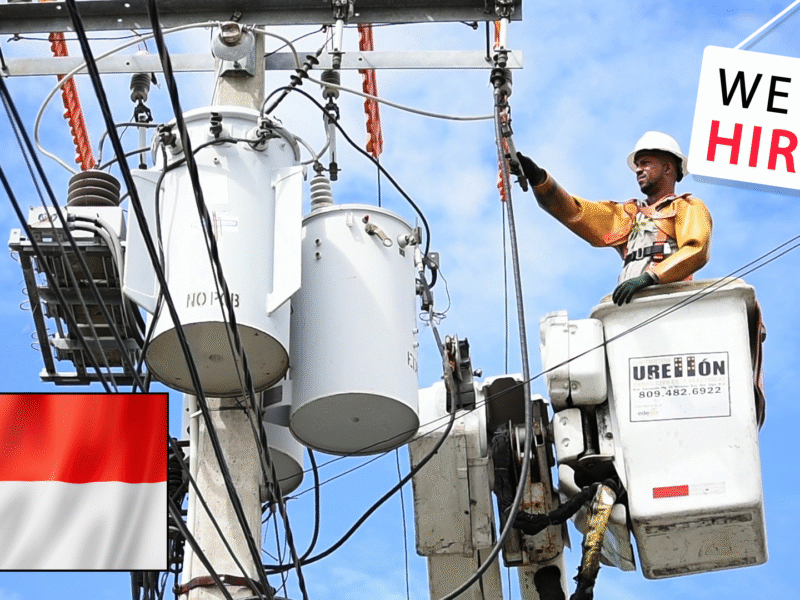Singapore, a global financial and technological hub, is currently experiencing a growing demand for skilled tradespeople, especially electricians. With ongoing urban development, rising industrial activity, and smart city innovations, electricians have become an essential part of Singapore’s infrastructure and economy.
For foreigners seeking employment opportunities abroad, electrician jobs in Singapore offer an excellent pathway to stable income, professional growth, and permanent settlement options.
For international workers, the biggest attraction is not only the competitive salary but also the fact that many employers offer visa sponsorship as part of their recruitment packages. This significantly reduces the barriers to entry for qualified electricians from overseas, allowing them to legally work and live in Singapore.
Employers in the country are actively searching for individuals who meet both skill and safety standards, offering attractive contracts and long-term employment guarantees.
In 2025, the outlook for electrician jobs continues to improve, making it one of the top trade professions for foreign applicants. Many job roles are now tailored to support infrastructure projects, including residential developments, commercial buildings, industrial manufacturing plants, and tech installations.
For those with relevant skills, Singapore is not just another job market—it is a country where their expertise is valued, and their futures can be secured.
As demand grows, so do the opportunities to earn higher wages and access better benefits. Many electrician jobs in Singapore now come with free accommodation, transport allowances, medical insurance, and overtime bonuses. This, combined with visa support, makes it a highly attractive destination for job seekers from Asia, Africa, and Europe.
Whether you’re a beginner electrician or an experienced professional, this guide explores everything you need to know—types of jobs available, the skills required, where the highest paying roles are, and how to apply for jobs with visa sponsorship.
For many, this could be the gateway to a successful career abroad, especially in a safe, modern, and economically stable environment like Singapore.
Why Work in the Electricity Industry?
Choosing a career in the electricity sector in Singapore is not only financially rewarding but also professionally fulfilling. The industry is currently one of the fastest-growing sectors in the country, backed by the government’s continued investment in infrastructure, digital technology, and renewable energy.
From high-rise residential buildings to advanced data centers and commercial office towers, every new project requires the expertise of licensed electricians.
Singapore’s construction and manufacturing sectors are experiencing a significant increase in demand for skilled workers. Electricians are a crucial part of these developments because they ensure the safety, efficiency, and functionality of power systems in every aspect of modern life.
Working in the electricity sector also provides access to some of the most cutting-edge tools and systems in the world, from smart grid technologies to integrated automation networks.
Foreigners working in Singapore’s electricity sector benefit from strong labor laws, regulated working hours, and mandatory health and safety protocols. These guarantees create a safer, more reliable working environment compared to many other countries.
Additionally, electricians in Singapore are often involved in projects with multinational companies, which can open doors to future job placements in other countries or higher management roles within the region.
The electricity industry is also future-proof. Unlike many sectors that can be affected by automation, electricians are needed for hands-on work that machines cannot fully replace. As long as buildings are constructed and machines are installed, there will always be demand for trained electrical professionals.
Many companies provide training and certification programs to help their employees grow, especially those who show commitment and strong technical skills. These certifications not only increase your chances of higher pay but can also qualify you for longer-term work passes and residency options through the Ministry of Manpower’s skilled worker pathways.
In short, working in Singapore’s electricity industry offers long-term stability, consistent demand, excellent salary prospects, and career advancement opportunities. For foreign job seekers, these benefits make it one of the best job sectors to target, especially with the added advantage of visa sponsorship and legal employment support.
Types of Electrician Jobs in Singapore with Visa Sponsorship
Singapore offers a broad range of electrician roles tailored to various industries. These roles vary in complexity, responsibilities, and salary, but they all share one thing in common—high demand.
From residential wiring to industrial installations and commercial maintenance, every area of Singapore’s economy needs qualified electricians. Companies are more than willing to sponsor skilled foreign workers, especially when local talent is not sufficient to meet the needs.
The most common roles include residential electricians, who are responsible for installing and maintaining wiring systems in homes and apartments.
These jobs often involve tasks such as setting up lighting, switchboards, outlets, and circuit breakers. Foreigners with basic electrical certifications and some experience can easily qualify for these roles, and many employers provide on-the-job training.
Another high-demand category is industrial electricians. These professionals work in factories, power plants, and large-scale manufacturing units. Their duties involve handling complex machinery, electrical panels, and control systems.
Due to the nature of the work, employers prefer candidates who are already familiar with industrial standards. However, companies are willing to sponsor skilled individuals and offer additional certifications once they are hired.
Maintenance electricians are also essential in Singapore’s commercial and retail sectors. These workers are in charge of identifying electrical faults, performing regular inspections, and conducting necessary repairs in malls, office buildings, and public facilities. Since Singapore values uninterrupted services, maintenance roles are often backed by urgent hiring processes and come with higher pay scales.
Construction electricians are another group that is consistently in demand. With many residential and commercial development projects ongoing, construction electricians are needed to install electrical infrastructure from the ground up. These roles offer excellent job security and may include overtime pay due to the tight schedules of building projects.
Lastly, HVAC electricians specialize in working with heating, ventilation, and air conditioning systems. Their job combines electrical skills with mechanical knowledge. This category pays well due to the technical requirements and is a top choice for experienced workers seeking higher compensation.
In all these roles, visa sponsorship is typically included, especially for candidates with strong resumes, safety training, and verifiable work history. Employers prefer hiring from countries with similar standards in electrical work, ensuring an easier transition to Singapore’s systems and safety regulations.
Entry-level Skills and Experience Required
While electrician roles in Singapore offer high pay and growth opportunities, employers expect a basic level of competence and training from all candidates. For foreigners, this means having both theoretical knowledge and hands-on experience before applying. However, the good news is that entry-level positions still offer visa sponsorship, especially when there’s a genuine shortage of local labor.
To begin with, applicants should possess a recognized electrical certificate or diploma from a reputable institution. Although a university degree is not mandatory for many technician-level jobs, vocational qualifications or trade school diplomas significantly improve one’s chances. Employers prefer candidates who understand safety codes, local wiring standards, and can read basic electrical blueprints.
Experience, even if limited, adds value. Many companies are willing to consider workers with one to two years of practical experience in residential, commercial, or industrial settings. The ability to handle basic tools such as wire strippers, voltmeters, and pliers is essential. Candidates should also be able to troubleshoot problems and work with minimal supervision.
Foreign applicants must also demonstrate communication skills. English is the primary working language in Singapore, so basic proficiency in speaking and understanding instructions is critical.
Workers who can communicate effectively with supervisors and colleagues are always more desirable, especially in fast-paced environments like construction sites and factories.
Singapore also places a strong emphasis on safety. Candidates who have received first-aid training or hold safety certificates such as OSHA or equivalent are often prioritized.
Employers prefer workers who already understand the importance of personal protective equipment (PPE), circuit isolation procedures, and electrical hazard protocols.
Some companies require workers to pass a skills evaluation test upon arrival. This is conducted under the Ministry of Manpower’s Skills Evaluation Certificate (SEC) program, ensuring that all foreign workers meet local standards. While this might seem like a hurdle, it’s a pathway that many successfully complete—especially when the employer provides preparatory support.
To summarize, getting an electrician job with visa sponsorship in Singapore is very achievable even for entry-level candidates. With the right certifications, basic experience, and willingness to learn, foreign workers can quickly find opportunities that offer full-time contracts, relocation support, and upward mobility.
Regions with the Highest Payment Structures
When it comes to electrician salaries in Singapore, location plays a key role. While the country is small in size, its economic zones differ in terms of industry concentration, project scale, and living standards. These factors contribute to varying payment structures across the island.
Central Singapore, particularly in areas like Orchard, Marina Bay, and Raffles Place, is home to large commercial buildings and luxury developments. Electricians working in these locations are often involved in high-end installations that require precision and advanced technical skills.
As a result, wages here tend to be higher. Moreover, commercial maintenance contracts in central districts often come with overtime pay, allowances, and bonuses due to 24/7 operational demands.
The Jurong Industrial Estate in the west is another top-paying region for electricians, especially those with experience in industrial wiring, automation systems, and factory maintenance.
This area is home to manufacturing plants, logistics warehouses, and refineries. Electricians working in Jurong are compensated well for the technical complexity and shift-based schedules often required.
In the northeast, Ang Mo Kio and Seletar have seen rising pay scales due to the increasing number of tech companies and semiconductor firms setting up shop in the region. Electricians involved in precision electrical work, lab equipment installations, and sensitive circuitry often earn more than average wages.
Tuas, in the far west, has emerged as another high-paying region due to the presence of shipyards and large construction projects. Electrical work in Tuas involves marine-grade equipment, high-voltage setups, and extensive safety compliance. These conditions attract experienced professionals who are paid premium salaries for their risk exposure and specialized knowledge.
While housing costs in certain high-paying areas can be higher, many employers provide free accommodation or housing subsidies to make the roles more accessible. Jobs that require travel to various locations across Singapore also offer transport allowances to cover commuting costs.
Understanding these regional differences helps foreign applicants target job opportunities strategically. It also enables them to make informed decisions when evaluating job offers, ensuring that compensation aligns with workload, technical difficulty, and living expenses.
Salary Expectations for Electricians
Electricians in Singapore enjoy some of the highest salaries in Southeast Asia for trade professionals. With the right skills and experience, foreign workers can expect to earn between SGD 2,800 to SGD 7,000 per month, depending on the complexity of the role and employer size.
In yearly terms, this translates to approximately $30,000 to $85,000 USD, making it one of the best-paying electrician jobs in the region for foreigners.
Entry-level electricians, especially those involved in residential installations or basic wiring projects, typically earn between SGD 2,000 and SGD 3,200 monthly. While this might seem modest, it often includes free accommodation, meals, or transport, making it cost-effective for newcomers. Over time, wages increase with experience and specialization.
Those working in industrial and commercial sectors can expect significantly higher earnings. Electricians in factories, power plants, or construction sites often make SGD 3,500 to SGD 5,500 per month.
These roles usually involve overtime pay, shift allowances, and performance-based bonuses. Professionals who hold additional certifications, such as High Voltage or PLC programming, can command salaries closer to SGD 6,500 or more.
Supervisory roles or those with team responsibilities also pay higher. Lead electricians or electrical engineers managing multiple projects or handling inspection duties can make over SGD 7,000 monthly. These senior roles are commonly available to foreigners who prove their skills and reliability over a period of time.
Some employers offer long-term contracts that come with annual pay raises, performance bonuses, and even family visa support. The total compensation often includes mandatory benefits such as health insurance, CPF (for permanent residents), paid leave, and job security.
Compared to many other countries in the region, electrician jobs in Singapore offer superior salaries, better legal protections, and long-term stability. With consistent demand, these roles are ideal for foreign workers looking to build a secure financial future while enjoying modern living conditions.
Visa Types and Options for Electricians
Securing the right visa is a crucial step for any foreign electrician looking to work legally in Singapore. Fortunately, the country has a structured immigration system that supports skilled labor, especially in industries facing local shortages like electrical work.
The Singaporean government, through the Ministry of Manpower (MOM), has made it easier for employers to sponsor foreign talent by offering multiple work visa options based on skill level, salary, and job scope.
The most common visa for foreign electricians is the Work Permit (WP). This visa is typically issued to semi-skilled workers in construction, manufacturing, and similar sectors. It allows electricians from approved countries to live and work in Singapore under the sponsorship of an employer.
The WP is valid for up to two years and is renewable. However, it is tied to the specific employer, meaning workers cannot switch jobs freely without going through a new application process.
For those with more experience, higher qualifications, or supervisory responsibilities, the S Pass is often the better option. This visa is designed for mid-level skilled workers and requires a minimum monthly salary of SGD 3,150 (as of 2025), although electricians with more experience often earn above this threshold.
To qualify, applicants must hold recognized qualifications, such as a diploma or relevant technical certifications, and their employer must meet specific quota and levy conditions.
The highest level of work authorization is the Employment Pass (EP), usually reserved for professionals with advanced technical skills or managerial roles. Although less common for general electricians, EPs may apply to those in senior electrical engineering or project management roles who oversee installations or compliance. This visa requires a monthly salary of at least SGD 5,000 and is valid for up to two years.
All work visa applications must be submitted by the sponsoring employer, not the applicant. This makes it essential for job seekers to secure employment before applying for any visa. The process generally involves a job offer, submission of personal and professional documents, medical examination, and approval by the MOM.
Singapore also conducts Skills Certification Evaluation under the SEC(K) scheme, which assesses the technical ability of foreign applicants. Passing this test is often a requirement for those on Work Permits and S Passes in construction-related roles, including electricians.
Once a foreign worker is in Singapore, they are issued a Work Pass Card, which contains key details like the visa type, employment status, and employer name. This card must be carried at all times and serves as legal proof of one’s right to work in the country.
In addition to these visa options, some long-term workers may qualify for Permanent Residency (PR) after several years of stable employment. This pathway is especially attractive to electricians who want to bring their families to Singapore and settle permanently. Being a PR unlocks more rights and benefits, including access to government housing, healthcare, and the Central Provident Fund (CPF).
For job seekers abroad, it is advisable to avoid unofficial agents or brokers promising jobs without valid contracts. All employers offering visa sponsorship must be registered with MOM and licensed to hire foreign workers. Verifying job offers and visa sponsorship legitimacy through official channels protects applicants from scams and ensures a smooth relocation process.
How to Find Electrician Jobs in Singapore with Visa Sponsorship
Finding electrician jobs in Singapore that include visa sponsorship requires a focused strategy, especially for foreign applicants who are not already in the country. The first step is identifying trusted employers who are licensed to hire foreign workers and have a track record of supporting work permit applications. Fortunately, there are several channels through which candidates can find legitimate and well-paying opportunities in the electrical sector.
One of the most reliable methods is through official job portals and recruitment platforms. Websites such as MyCareersFuture, JobStreet Singapore, and JobsDB often list openings from verified employers, many of whom specify whether they offer visa sponsorship.
These listings typically include salary details, job descriptions, and requirements, making it easier to find positions that match your skill level. Applicants should use targeted search terms like “electrician jobs with work permit” or “visa sponsorship electrician Singapore” to narrow down their results.
Another effective approach is working directly with licensed employment agencies in Singapore. These agencies are regulated by the Ministry of Manpower and are authorized to recruit foreign talent.
They often partner with construction firms, factories, and commercial service providers to fill urgent vacancies. Reputable agencies can guide you through the entire process—from resume submission to interview arrangements and visa paperwork.
For more experienced candidates, LinkedIn is an excellent platform to connect with employers, project managers, and recruiters in the industry. Creating a professional profile that highlights your electrical certifications, project experience, and safety training increases your visibility. Employers in Singapore regularly scout for foreign talent on LinkedIn, especially when dealing with tight deadlines or labor shortages.
Some large companies in the construction, manufacturing, or real estate industries also have dedicated career sections on their websites. Organizations like Sembcorp, Keppel, Woh Hup, and ST Engineering occasionally post openings for electricians and technicians. Applying directly through the company’s portal ensures your application is received without going through middlemen.
Foreign applicants should also consider applying through government-approved training and placement programs. Countries like India, Bangladesh, and the Philippines often have official agencies or programs that partner with Singaporean employers to supply skilled electricians. These programs usually include pre-departure orientation, skill verification, and assistance with visa processing.
When applying, always ensure your resume and cover letter are tailored to Singapore’s labor market. Highlight your years of experience, specific electrical systems you’ve worked with, safety certifications, and ability to work under pressure. Employers value clear communication, punctuality, and a commitment to following local regulations.
After receiving a job offer, the employer will initiate the visa application on your behalf. Be prepared to submit documents such as your passport, educational certificates, work references, and health records. Some companies may require you to undergo a trade test or technical evaluation, either in your home country or upon arrival in Singapore.
Lastly, once your visa is approved and your employment is confirmed, the employer will provide travel arrangements, accommodation details, and onboarding instructions. Many roles also include relocation allowances or first-month salary advances to help new workers settle in.
In conclusion, while finding electrician jobs in Singapore with visa sponsorship requires effort, the opportunities are real and highly rewarding. By focusing on trusted channels, preparing strong applications, and targeting high-demand sectors, foreign electricians can successfully launch their careers in one of Asia’s most advanced and welcoming job markets.






